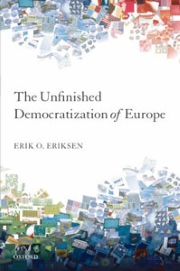 Alas, the resources for such a move are shallow at the European level and it is the member states that hold the means of legitimate violence in reserve. The European Union is a polity that does not itself have direct control of a given territory; it lacks a collective identity; truly hierarchical principles of law and powerful enforcement means.
Alas, the resources for such a move are shallow at the European level and it is the member states that hold the means of legitimate violence in reserve. The European Union is a polity that does not itself have direct control of a given territory; it lacks a collective identity; truly hierarchical principles of law and powerful enforcement means.
The point is however that the widening and deepening of the European Union have brought to the fore the question of democracy at the European level. The system of domination already in place at the European level requires and aspires to direct legitimation – from the citizens themselves and not merely indirect, derived from the Member Nation States. Such can only be achieved by making the EU into a democratic polity. It is argued that post-national democracy requires a constitution but not necessarily a state.
It is further argued that the Union amounts to less than a state but more than an international organisation and a system of transnational governance. The EU is conceived of as a regional subset of an emerging cosmopolitan order based on a state-less government.
The book analyzes the reforms undertaken to bring the EU ‘closer to the citizens’. It documents elements of democratization and reduction of arbitrary power. However, democracy requires that the citizens can approve or reject the laws they are subjected to. Since the institutional as well as the civic conditions under which a public justification process would be deemed legitimate are not in place, European post-national democracy remains an unaccomplished mission.
Full info:
The Unfinished Democratization of Europe
Erik Oddvar Eriksen, Oxford University Press 2009